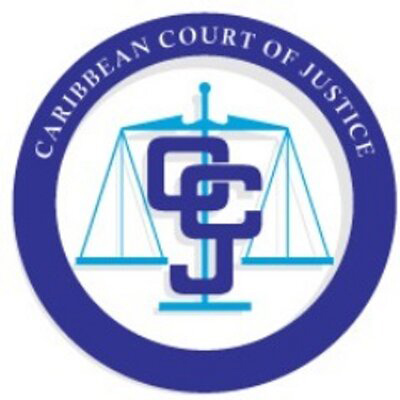While affirming a decision of the Council for Trade and Economic Development (COTED) to raise tariffs on “other hydraulic cement” imported into Barbados, the Caribbean Court of Justice (CCJ) on Wednesday declared that both CARICOM and Barbados failed in their respective duties to conduct prior consultation with the affected importer—Rock Hard Cement Limited.
Rock Hard would later take the Barbadian government and CARICOM to court to challenge the increase.
The Court also granted Arawak Cement Company Limited, the only domestic producer of cement in Barbados, leave to intervene in the proceedings.
Almost a year ago, COTED, the organ of CARICOM responsible for altering or suspending the Common External Tariff (CET), approved Barbados’ application to suspend the CET of 5% on “other hydraulic cement” in order to replace it with a tariff of 35%.
The request was on the basis that there was—a critical shortfall in government revenue being experienced in Barbados, a need to support an industry in that country, and that the product was of strategic importance to the economic development of Barbados.
Though requested for a 5-year period, the suspension was only authorized for two years.
Rock Hard which imports into Barbados other hydraulic cement manufactured in Turkey, was not consulted or notified before the application to raise the tariff was made or granted although both Barbados and COTED knew the impact the decision would likely have on that company.
Rock Hard argued that the decision to raise the tariff should be annulled, since it had a legitimate expectation that Barbados would keep the tariff steady at the rate of 5% because of alleged representations made to it by Barbadian officials in 2015 when the country reduced the tariff from 60%, where it stood in 2015, to the CET rate of 5%.
This was as a result of a derogation sought and obtained from COTED by Barbados in 2001. At Rock Hard’s instance, Barbados unilaterally restored the tariff to the CET rate of 5% expressly to support Rock Hard’s business, as confirmed by the Cabinet Note confirming the reduction.
An August 6th, 2019 ruling of the court classified Rock Hard Cement as “other hydraulic cement” for which the applicable CET range was to be 0-5%.
Barbados had denied that the communications in question gave rise to a legitimate expectation that it would permanently apply the CET of 5% on other hydraulic cement, or that a suspension of that rate would never be sought, as this would mean that successive Governments of Barbados would also be bound not to ever invoke the right afforded by Article 83 of the Revised Treaty of Chaguaramas (RTC) to seek suspension or alteration of the CET.
Barbados also argued that Rock Hard was aware of its intent to suspend the CET and increase the tariff since July 2018 and that, even if Rock Hard had any legitimate expectation as claimed, Barbados would have been entitled to disappoint it where overriding public interest considerations existed.
Both CARICOM and Arawak Cement Limited agreed with Barbados.
Arawak has submitted that Barbados was not competent to make any unqualified representation that would bind CARICOM and that COTED, the actual decision-maker, did not make any such representation.
The CCJ held that in order for Rock Hard to succeed in the court’s Original Jurisdiction, the alleged representations that gave rise to its expectation had to have come from CARICOM, while noting that there was no evidence that it was COTED which made those representations to Rock Hard.
The Court went on to hold that subsequent knowledge by COTED of the alleged representations could not make it a party to them since those representations had not been made on COTED’s behalf.
The Court also dismissed Rock Hard’s claims that the COTED decision was arbitrary or irrational. In fact, the Court said that the rationale and justification presented to COTED by Barbados were supported by factual circumstances and that in any event, the grounds on which the request was approved clearly fell within a category which allows COTED a broad discretion and where the scope for the Court’s intervention is narrow.
The Court, however, declared that the state and CARICOM failed to ensure that Rock Hard was consulted before the application for the suspension was approved.
Rock Hard was only notified of the suspension at a meeting with representatives of Barbados on 2nd September 2019, where Barbados also indicated that the Statutory Instrument to implement the 35% tariff was being prepared.
By letter dated 24th September 2019, Barbados confirmed that the new tariff was implemented on 9th September 2019 when the Customs Tariff (Amendment) Order 2019 was published in the Supplement to the Official Gazette.
Because the consultation required for an application of this type was limited to obtaining information as to the impact of the proposed tariff increase, the Court ruled that the effect of the failure to consult did not call for annulment of the decision.
The CCJ, however, expressed consternation that CARICOM had failed to maintain an effective system of consultations at the national and regional level as required by Article 26 of the RTC.
The Court noted that the agreed procedures for the processing of requests to COTED, such as the one made by Barbados, had not yet been formally brought into force, finding this to be a weakness in the system.
The Court said it is a matter of Barbadian domestic policy whether that State wished to adopt measures to facilitate the importation of cement produced extra-regionally or encourage locally produced cement manufactured by Arawak Cement Company Limited; while, however, emphasizing that any such measures and the processes accompanying them must comply with the rule of law.
The judgment was delivered by the full Bench comprising the President, Justice Adrian Saunders together with Justices Jacob Wit, Winston Anderson, Maureen Rajnauth-Lee, Denys Barrow, Andrew Burgess and Peter Jamadar.








